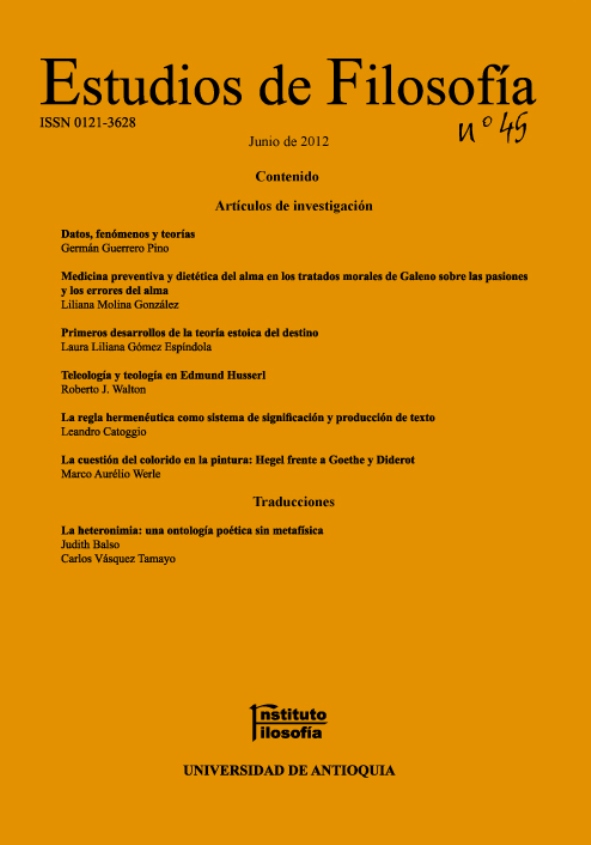Data, phenomena and theories
DOI:
https://doi.org/10.17533/udea.ef.13475Keywords:
Data, Phenomena, Theories, New Experimentalism, Semantic ApproachAbstract
This paper presents the model of three levels of scientific knowledge (data, phenomena and theories) bearing on the recent results of the actual Philosophy of Science obtained through two particular philosophical perspectives: The New Experimentalism and the Semantic Approach of Theories. In order to do so, it contrasts of the main approaches of these two perspectives with the model of two levels of scientific knowledge (observation and theory) which belong to Logical Positivism, and that dominated the outlook of the Philosophy of Science during the first six decades of the 20th Century.
Downloads
References
ACKERMANN, R. (1989) “The New Experimentalism”, en: Brit. J. Phil. Sci., 40, pp. 185-190. DOI: https://doi.org/10.1093/bjps/40.2.185
BOGEN, J. Y WOODWARD, J. (1988) “Saving the Phenomena”, en: Philosophical Review, 97, pp. 303-352. DOI: https://doi.org/10.2307/2185445
BUNGE, M. (2001) Philosophy in Crisis: The Need for Reconstruction. New York: Prometheus Books.
CARNAP, R. (1939) Foundations of Logic and Mathematics. Chicago: University of Chicago Press.
CARNAP, R. (1963) “Intellectual Autobiography”, en: Schilpp, P. A. (ed.). The Philosophy of Rudolf Carnap. La Salle, Illinois: Open Court, pp. 3-84.
FERREIRÓS, J. Y ORDÓÑEZ, J. (2002) “Hacia una filosofía de la experimentación”, en: Crítica, Vol. 34, No. 102, diciembre, pp. 47–86. DOI: https://doi.org/10.22201/iifs.18704905e.2002.979
FRANKLIN, A. (2007) “The Role of Experiments in the Natural Sciences: Examples from Physics and Biology”, en: Kuipers, T. (ed.). Handbook of the Philosophy of Science. Amsterdam: Elsevier DOI: https://doi.org/10.1016/B978-044451548-3/50006-9
B.V., pp. 219-274.
FRENCH, S. (2008) “The structure of theories”, en: Psillos, S. y Curd, M. (ed.). The Routledge Companion to Philosophy of Science. New York: Routledge, pp. 269-280.
GIERE, R. (1988) Explaining Science. The Cognitive Approach. Chicago: University of Chicago Press. DOI: https://doi.org/10.7208/chicago/9780226292038.001.0001
GIERE, R. (1999) “Using Models to Represent Reality”, en: Magnani, L. et al. (ed.). Model-Based Reasoning in Scientific Discovery. New York: Dordrecht, Kluwer, pp. 41-57. DOI: https://doi.org/10.1007/978-1-4615-4813-3_3
GUERRERO, G. (2010) “La noción de modelo en el enfoque semántico de las teorías”, en: Praxis Filosófica, No. 31, Julio-Diciembre, pp. 169-185. DOI: https://doi.org/10.25100/pfilosofica.v0i31.3434
HACKING, I. (1983) Representing and Intervening. Cambridge: Cambridge University Press. DOI: https://doi.org/10.1017/CBO9780511814563
MADRID, C. M. (2007) “De la equivalencia matemática entre la Mecánica Matricial y la Mecánica Ondulatoria”, en: La Gaceta, vol. 10, no. 1, pp. 103-128.
MAYO, D. G. (1994) “The New Experimentalism, Topical Hypotheses, and Learning from Error”, en: Philosophy of Science Association, Volume 1, pp. 270-279. DOI: https://doi.org/10.1086/psaprocbienmeetp.1994.1.193032
SUÁREZ, M. (2003) “Hacking Kuhn”, en: Revista de Filosofía, Vol. 28, Núm. 2, pp. 261-284.
THOMSON-JONES, M. (2006) “Models and the Semantic View”, en: Philosophy of Science, 73, pp. 524-535. DOI: https://doi.org/10.1086/518322
VAN FRAASSEN, B. C. (1989) Laws and Symmetry. Oxford: Clarendon Press. DOI: https://doi.org/10.1093/0198248601.001.0001
VON NEUMANN, J. (1932) Mathematical Foundations of Quantum Mechanics. Princeton: Princeton University Press.
WEBER, M. (2005) Philosophy of Experimental Biology. Cambridge: Cambridge University Press.
WOODWARD, J. (2000) “Data, Phenomena, and Reliability”, en: Philosophy of Science, Vol. 67, Supplement, pp. S163-S179. DOI: https://doi.org/10.1086/392817
WOODWARD, J. (2009) “Data and phenomena: a restatement and defense”, en: Synthese, Volume 182, Number 1, Published online: 07 July 2009. DOI: https://doi.org/10.1007/s11229-009-9618-5
Downloads
Published
How to Cite
License
Copyright (c) 2012 Germán Guerrero Pino

This work is licensed under a Creative Commons Attribution-NonCommercial-ShareAlike 4.0 International License.
Authors who publish with this journal agree to the following terms:
1. The Author retains copyright in the Work, where the term "Work" shall include all digital objects that may result in subsequent electronic publication or distribution.
2. Upon acceptance of the Work, the author shall grant to the Publisher the right of first publication of the Work.
3. The Author shall grant to the Publisher a nonexclusive perpetual right and license to publish, archive, and make accessible the Work in whole or in part in all forms of media now or hereafter known under a Creative Commons Attribution-NoCommercia-ShareAlike (CC BY-NC-SA 4.0), or its equivalent, which, for the avoidance of doubt, allows others to copy, distribute, and transmit the Work under the following conditions: (a) Attribution: Other users must attribute the Work in the manner specified by the author as indicated on the journal Web site;(b) Noncommercial: Other users (including Publisher) may not use this Work for commercial purposes;
4. The Author is able to enter into separate, additional contractual arrangements for the nonexclusive distribution of the journal's published version of the Work (e.g., post it to an institutional repository or publish it in a book), as long as there is provided in the document an acknowledgement of its initial publication in this journal;
5. Authors are permitted, and Estudios de Filosofía promotes, to post online the preprint manuscript of the Work in institutional repositories or on their Websites prior to and during the submission process, as it can lead to productive exchanges, as well as earlier and greater citation of published work (see The Effect of Open Access). Any such posting made before acceptance and publication of the Work is expected be updated upon publication to include a reference to the Estudios de Filosofía's assigned URL to the Article and its final published version in Estudios de Filosofía.















